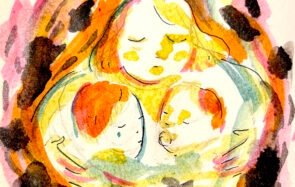When I was a teenager, we lived in suburban Boston. Our neighborhood was affluent but my family was broke. On summer Sundays, preparing for back-to-school, we bargain-hunted.
We visited clothing factories that, in the early 1960’s, still dotted New England mill towns. Factory back rooms would be open — Sundays only — and slightly (or more than slightly) imperfect clothing was on sale. Cheap. Those items were stamped “Irregular.”
I had Irregular jeans, skirts, sweaters, underwear. I joked that my last name was Irregular. But there was sorrow behind the joke. I was young and wanted to fit in with the popular kids. I wanted to be Regular.
Of course, no one knew that my clothes weren’t perfect. Still, the Irregular tag changed me in some profound way. I felt different. Or, maybe, I was different. I didn’t spend time going shopping, the way many other girls did almost every Saturday, it seemed. When I went shopping, I didn’t buy much. I couldn’t. Unlike my junior high school peers, I didn’t have free rein with a credit card. My family didn’t even have credit cards. Back then, there was no Mastercard or Visa, just individual cards for each store. One for Filene’s. One for Jordan Marsh, and so on.
A few years before, when I was 10, my father’s discount TV and appliance store business flopped. He went bankrupt. I remember watching my mother at our round, kitchen table, cutting up all our store cards.
After that, we paid cash. Always. If we didn’t have the money, we didn’t buy the thing. End of story. And when we did need things, we bought bargains. Irregulars.
The time came that we needed a new car — ours had broken down, irreparably. My parents found a previous year’s model that was priced right.
That car, a Dodge Charger, was shiny, bright, and new. It was also purple. Talk about not fitting in with the “in” crowd! Still, it got us where we needed to go. Our clothes kept us warm. We didn’t spend money shopping for things we didn’t need. I didn’t spend time shopping for things I didn’t need.
What’s more, I didn’t hang around people I didn’t enjoy. I read and I thought and I chose my friends carefully. I still do.
Turns out, there were benefits to being Irregular. There still are.
These days, thanks to the pandemic, we’re all Irregular. We’re not seeing friends or family like we used to; we’re all reading more, thinking more, watching more TV. Most of us are not shopping for things we don’t need. Small talk, casual grocery-store conversations about peaches, the weather, or new products are gone. For those of us who are not, in some way, essential workers, the pandemic has stolen a big piece of our humanity — our willingness to help a stranger, to smile and say hello.
Yet our humanity depends on each other. In Pirkei Avot, we read, “Greet every person with a pleasant countenance,” i.e., a smile. That’s difficult, of course, when we’re wearing masks. Yet it’s important. In these Irregular times, we have to — somehow — show others that we are respectful of them and aware of their humanity as we also want them to be aware of ours. Bantu languages have a word, ubuntu, that describes this interconnectedness. Loosely translated, it means, “my humanity depends on your humanity,” or “I am who I am because of you.” We are all connected. Yet we are in danger of losing those vital connections.
The good news is that hope — vaccines — is here. It is taking some time, but more of us are getting vaccinated each day, and we must all be vaccinated. My humanity depends on your humanity. We are all in this soup together. All of us are part of the human condition.
It will be nice to smile at strangers again, or to chit chat with your neighbor when you check the mail, or to pick up an interesting vegetable in the supermarket, turn to someone nearby and say, “Beautiful, isn’t it?” It’s these little moments that we, as human beings, need. It’s when we realize that Irregular as we are, we all sparkle.
As for my family, as a result of our back-to-school shopping trips, my father began buying Irregulars and other less-than-perfect items and warehousing them. One day a week — on Sundays — my father opened his warehouse to the public. Bargain hunters came from all over New England. Soon Building #19, Inc. opened two days a week, then three, then seven days. His business grew to 12 stores… and lasted almost 50 years. Quite a gem for something Irregular.
This Irregular time will yield gems, too. We’ll learn, and, someday soon, we’ll all sparkle once again.
Header image by Ekaterina Kapranova/Getty Images








